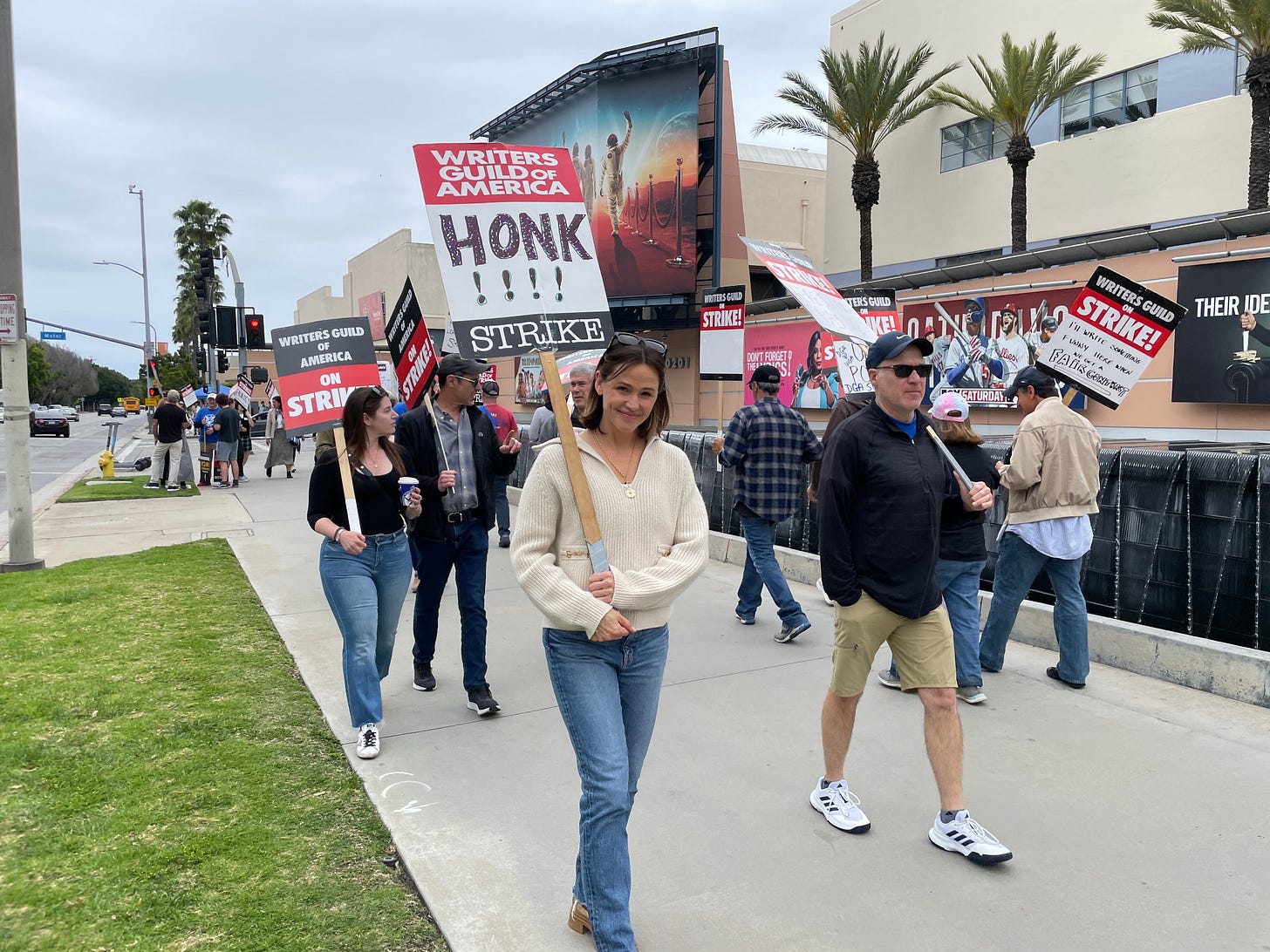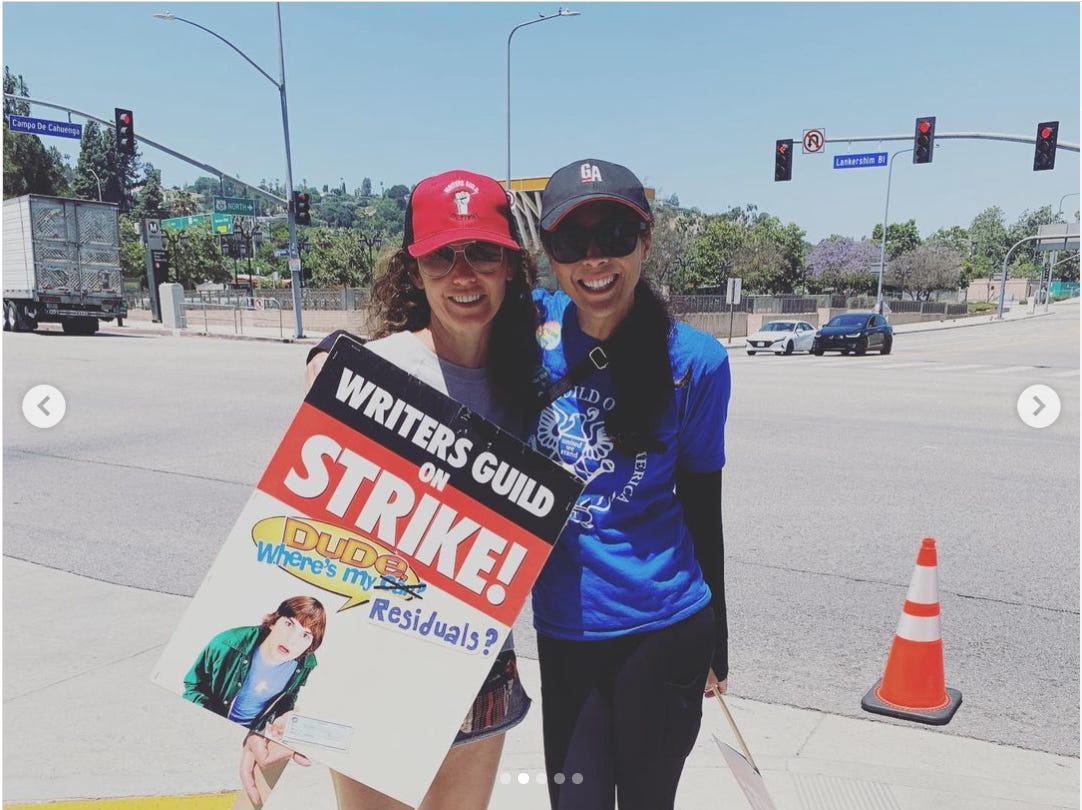Daily Digest: All Eyes on Actors as SAG-AFTRA Deal Deadline Looms
➕ Strikegeist readers react strongly to Taylor Sheridan's 'THR' cover interview

As of Monday, folks are still trying to read the tea leaves in SAG-AFTRA president Fran Drescher and chief negotiator Duncan Crabtree-Ireland’s cheery video message to its actor membership over the weekend, and whether it means the guild is likely to strike or agree to a new TV/theatrical/streaming contract with the AMPTP.
A new report from Variety’s Gene Maddaus and Cynthia Littleton points to sources who say both the actors union and major studios are “far apart on a range of issues,” in particular SAG’s desire for viewership-based streaming residuals (also one of the WGA’s demands). There’s reportedly friction over what constitutes an agreed-upon metric to rely on, pointing to perhaps one of the greatest issues of the streaming economy that is the root of so many issues: data transparency.
SAG-AFTRA has proposed using data from Parrot Analytics as the benchmark. Founded a decade ago, the research firm uses a mix of data sources — including search queries, fan sites, social media engagement and downloads — to estimate the global popularity of shows.
But the studios have been unwilling to peg compensation to third-party estimates, which might not be entirely reliable and could be subject to unannounced changes in the algorithm or to gaming. For instance, actors might be able to profit from driving social media engagement that does not translate to subscriptions or even to viewership.
Meanwhile, you all had THOUGHTS on Yellowstone creator Taylor Sheridan, following that Hollywood Reporter cover story — from whether he really has been operating without a proper writers room to his status as a lone wolf in an industry built on writers rooms and collaboration.
I don’t have space for all of your responses (have I ever received so much reader mail on a single topic? No), but here’s a letter to the editor — if we can still call them that when they’re emails to reporters — from Strikegeist reader and Arrested Development and Mad About You writer Richard Day:
Whenever anyone makes a big deal about how fast or much they write, there's always an asterisk and it's *they're lying. Nobody writes scripts in eight hours. Not Max Landis or Taylor Sheridan or Aaron Sorkin or Susan Harris or Linda-Bloodworth Thomason or Larry David or Tyler Perry. There's always, always a writing staff doing very heavy lifting. Sometimes the what-a-genius brings in a few pages for the room to "finish." Sometimes the whole thing is room written and the unbelievably talented dynamo puts their name on every script. In the case of short seasons or movies the lies are about how long they took. Or sometimes as with TS you get both.
That doesn't have a lot to do with whether he has a point. I doubt it will be an issue. I guess in a world where people are dashing off shootable first drafts in eight hours the guild could also get everything it's asking for but I wouldn't worry about it til it happens.
And here’s one from another Strikegeist reader, who would prefer to remain anonymous…
The part where he doesn't get notes is ultimate privilege bullshit . All these "auteurs" have somehow hypnotized the suits to treat them like they're special geniuses. Most of us slog through notes on story documents, outlines and scripts through three levels of notes (production company, studio, network). YOU CAN'T WRITE ALL THE EPISODES if you get that micro-manage-y bullshit. Especially when your story could be thrown out at ANY TIME.
Also, Yellowstone is a drama. Try doing what he's doing with a comedy. For a 22 episode order. You know what you'll get? A drama with a couple of jokes in it.
As far as I'm concerned, Sheridan doesn't have to tell TV stories anymore anyway.
(Literally cannot believe what an asshole he sounds like. Floored).
More thoughts on either SAG or Taylor Sheridan? Talk to me: elaine@theankler.com
Today in Strike News
One seismic difference between now and 2007/2008: strikers’ ability to use social media, which has in essence made numerous writers bigger voices than the WGA itself. “I can’t imagine being WGA comms right now,” says a communications director at a major non-Hollywood union. “To have some members with platforms bigger than the organization? That’s a unique challenge.” (The Hollywood Reporter)
While The Animation Guild expressed support for the WGA at the onset, more attention has been drawn recently to the unusual method by which animated shows are covered by either union, and how the decision is left up to the studios. “It seems to be me as that should be illegal, it seems like labor should decide which union they want to belong to, not the employer,” Michael Jamin, a co-EP on several animated series, said. (Deadline)
In the wake of the strike’s effect on its workers, the International Brotherhood of Teamsters union is setting aside $2 million to assist members facing financial troubles. (The Hollywood Reporter)
SAG-AFTRA president Drescher has received endorsements from both major political parties within the guild in her bid for reelection. (The Hollywood Reporter)
The Nantucket Film Festival, a writer-centric event lasting six days, culminated with a picket line at the island’s main public library that was encouraged by the festival itself. (IndieWire)
The host-less, writer-less BET Awards on Sunday included a segment in which singer Muni Long got up on stage and demonstrated her support for the strike prior to introducing a musical act. “I must take a moment to acknowledge and stand in solidarity with the artists who make us laugh, cry, and most importantly, think — our Writers Guild of America family,” she said. “Writers are, in many instances, the glue to the execution of artistry and storytelling. Our ability to extract emotion from performers helping them to articulate their voices and vision to the world is irreplaceable. The protection of the writer is crucial. We simply must protect our intellectual property.” (Deadline)
Picket Sign of the Day
Dude, where’s my residuals? An early aughts classic.

Additional reporting by Matthew Frank.





But did anyone agree with Taylor or Mike? Is it black and white, or is there a grey area? The extremes are worthy, but how do we find a place to meet in the middle? The actors are still part of gig culture--- always will be. Actors want more work and stability too! Complaining that writing is a "gig culture" is not understanding the concept of creativity and commerce -- which has a long history. If you go to college, do a studio "writers program," and expect to be employed, someone has sold you a large bottle of bullshit. Is being a writer/creative moving toward art, or is it just a job? Or both? Employment matters, but you might only sometimes get to write for a living -- or never. And you may be GREAT! You may serve drinks, copywrite, dog sit, or drive Uber. If you want to write, all these questions must come into play. Telling stories is a privilege, and it's hard to get better. We need to mentor and give lots of opportunities and, by goddess, diversify stories in TV and film. Collaboration is a magical and powerful force when it comes to storytelling. But the bigger question would be, should people expect a job in TV writers' rooms? And what does that do to the content? To the art? To society? Can less content make a change? Has the abundance watered down the power of writing? Who knows? Can we employ all writers in the guild all the time? What would that look like? Musings...
The jealousy in those two letters is obvious.